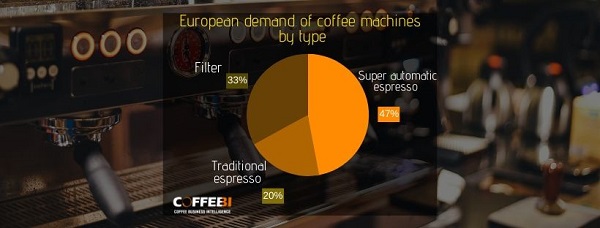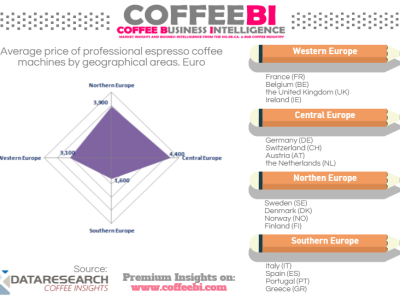Professional coffee machines in Europe: Part 1
When a customer is looking for a good coffee, firstly they think of the mixture, then, of a good coffee machine, and in some cases even of an experienced bartender.
The coffee machine is the other side of the coin, the tool that allows the mixture to become a drink, enhancing its quality and its capacity to be enjoyed.
There are many types of machines, and someone has also been passionate about cataloguing them, listing the various ways of making coffee.
Leaving aside the domestic methods, there are coffee machine model types that can be split into three macro-categories: espresso, filter and instant.
No method is better than another. The difference stems from the technology selected by the producers.
In the first category, the coffee is obtained by passing the mixture through hot water under pressure, in the second category, the mixture is put through a filter without pressure, and in the third category, hot water is added to the mixture.
The result of each category is a different quality of coffee: extremely creamy in the case of espresso; less creamy and larger in other cases.
The greater or less use of a machine depends on the type of coffee drunk in a country.
In Italy and France, for example, espresso is preferred, but in other countries in Central and Northern Europe, filtered coffee is most popular. In still others, such as in Russia, England and Spain, there is a high percentage of instant coffee consumption.

Professional coffee machines manufacturers in Europe
In Europe, in recent years, preference for espresso has increased, while demand for instant and filtered coffee has decreased.
Europe is the homeland of leading manufacturers of professional coffee machines.
Italy mainly hosts producers of traditional espresso machines, while Switzerland and Germany are the main manufacturers of super-automatic espresso machines and filter machines.
These three countries account for over two-thirds of the world’s total production of professional espresso machines, particularly of those in the higher price range.
The other main production countries are Spain, France, the Netherlands and Sweden. The main manufacturers of instant and filter machines are based in the Netherlands.
In recent years, some big operators have been strategically acquiring other brands of coffee machines to increase their leadership. The competition is very high and innovation is a key factor in maintaining and gaining market shares.
If you want more about this topic, read this article.

The market of Professional coffee machines
The European market of professional coffee machines for HORECA and OFFICE has a sell-in value of 865 million euros and an average growth rate of 3.5% has been recorded in recent years.
The super-automatic espresso and automatic office coffee system (OCS) machines represent the biggest share (47%), followed by filter machines (33%) and traditional espresso machines (20%).
A large percentage of the market is concentrated in Western Europe, the top five countries being Italy, France, Germany, Spain and the UK, together representing 62% of the total market.
The other 38% includes the other Western European countries and Eastern Europe.
Insights and market analysis for a specific country are available contacting coffeebi.com


